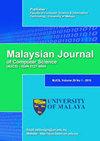FUZZY ADAPTIVE WHALE OPTIMIZATION ALGORITHM FOR NUMERIC OPTIMIZATION
IF 1.2
4区 计算机科学
Q4 COMPUTER SCIENCE, ARTIFICIAL INTELLIGENCE
引用次数: 0
Abstract
Meta-heuristic approaches are used as a powerful tool for solving numeric optimization problems. Since these problems are deeply concerned with their diversified characteristics, investigation of the utilization of algorithms is significant for the researchers. Whale optimization algorithm (WOA) is one of the novel meta-heuristic algorithms employed for solving numeric optimization problems. WOA deals with exploitation and exploration of the search space in three stages, and in every stage, all dimensions of the candidate solutions are updated. The drawback of this update scheme is to lead the convergence of the algorithm to stack. Some known meta-heuristic approaches treat this issue by updating one or a predetermined number of dimensions in their update scheme. To improve the exploitation behavior of WOA, a fuzzy logic controller (FLC) based adaptive WOA (FAWOA) is suggested in this study. An FLC realizes the update scheme of WOA, and the proposed FLC determines the rate of the change in terms of dimension. The suggested FAWOA is evaluated using 23 well-known benchmark problems and compared with some other meta-heuristic approaches. Considering the benchmark problems, FAWOA achieves best results on 11 problem and only differential evaluation algorithm achieve best results on 10 problems. The rest of the algorithms couldn’t achieve the best results on not more than 5 problems. Besides, according to the Friedman and average ranking tests, FAWOA is the first ranked algorithm for solving the benchmark problems. Evaluation results show that the suggested FAWOA approach outperforms the other algorithms as well as the WOA in most of the benchmark problems.模糊自适应鲸鱼优化算法的数值优化
元启发式方法被用作解决数值优化问题的强大工具。由于这些问题具有多种特点,因此研究算法的应用对研究人员来说具有重要意义。鲸鱼优化算法(WOA)是一种用于求解数值优化问题的新型元启发式算法。WOA分三个阶段处理搜索空间的开发和探索,在每个阶段,更新候选解决方案的所有维度。这种更新方案的缺点是导致算法收敛到堆栈。一些已知的元启发式方法通过更新其更新方案中的一个或预定数量的维度来处理此问题。为了改善WOA的开发行为,本文提出了一种基于模糊逻辑控制器(FLC)的自适应WOA (FAWOA)。FLC实现了WOA的更新方案,提出的FLC决定了维度变化的速率。建议的FAWOA使用23个众所周知的基准问题进行评估,并与其他一些元启发式方法进行比较。考虑到基准问题,FAWOA在11个问题上取得了最佳结果,只有微分评价算法在10个问题上取得了最佳结果。其余算法不能达到最佳结果的问题不超过5个。此外,根据Friedman和average排名测试,FAWOA是解决基准问题的排名第一的算法。评价结果表明,本文提出的FAWOA方法在大多数基准问题上都优于其他算法和WOA算法。
本文章由计算机程序翻译,如有差异,请以英文原文为准。
求助全文
约1分钟内获得全文
求助全文
来源期刊

Malaysian Journal of Computer Science
COMPUTER SCIENCE, ARTIFICIAL INTELLIGENCE-COMPUTER SCIENCE, THEORY & METHODS
CiteScore
2.20
自引率
33.30%
发文量
35
审稿时长
7.5 months
期刊介绍:
The Malaysian Journal of Computer Science (ISSN 0127-9084) is published four times a year in January, April, July and October by the Faculty of Computer Science and Information Technology, University of Malaya, since 1985. Over the years, the journal has gained popularity and the number of paper submissions has increased steadily. The rigorous reviews from the referees have helped in ensuring that the high standard of the journal is maintained. The objectives are to promote exchange of information and knowledge in research work, new inventions/developments of Computer Science and on the use of Information Technology towards the structuring of an information-rich society and to assist the academic staff from local and foreign universities, business and industrial sectors, government departments and academic institutions on publishing research results and studies in Computer Science and Information Technology through a scholarly publication. The journal is being indexed and abstracted by Clarivate Analytics'' Web of Science and Elsevier''s Scopus
 求助内容:
求助内容: 应助结果提醒方式:
应助结果提醒方式:


